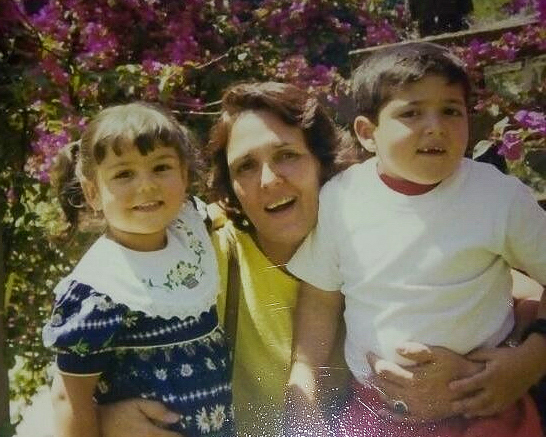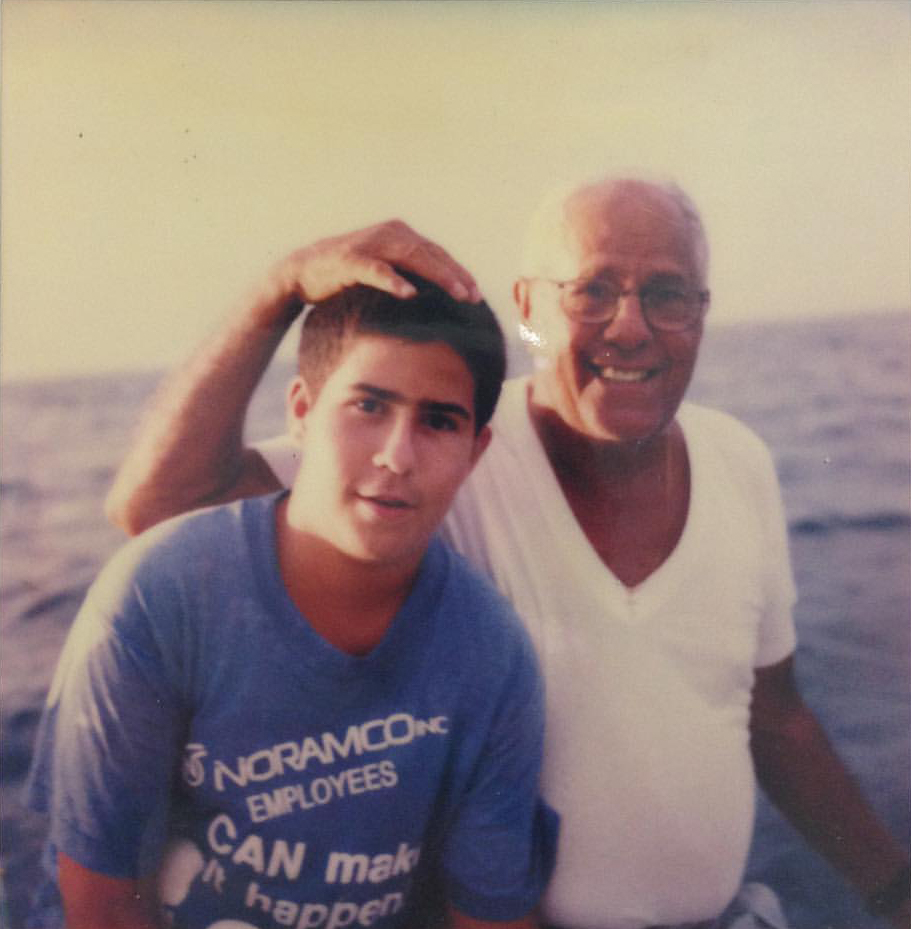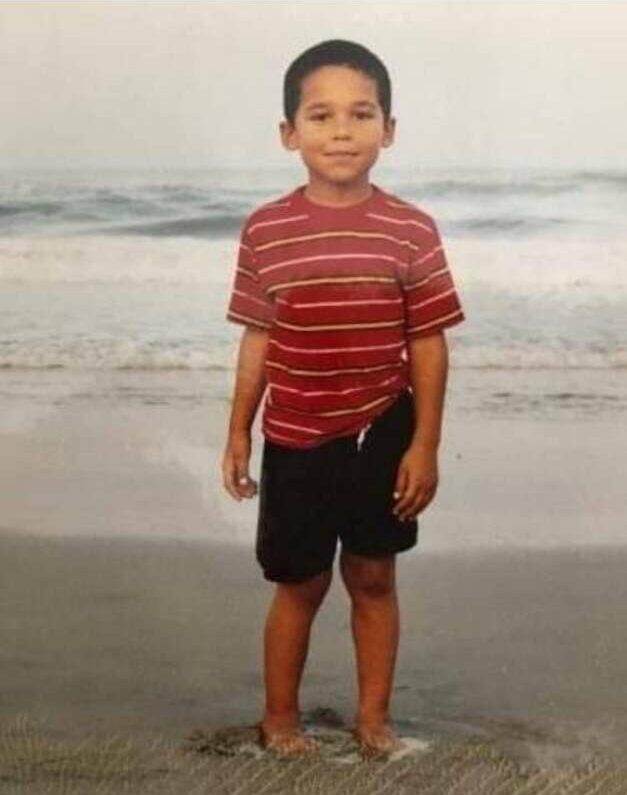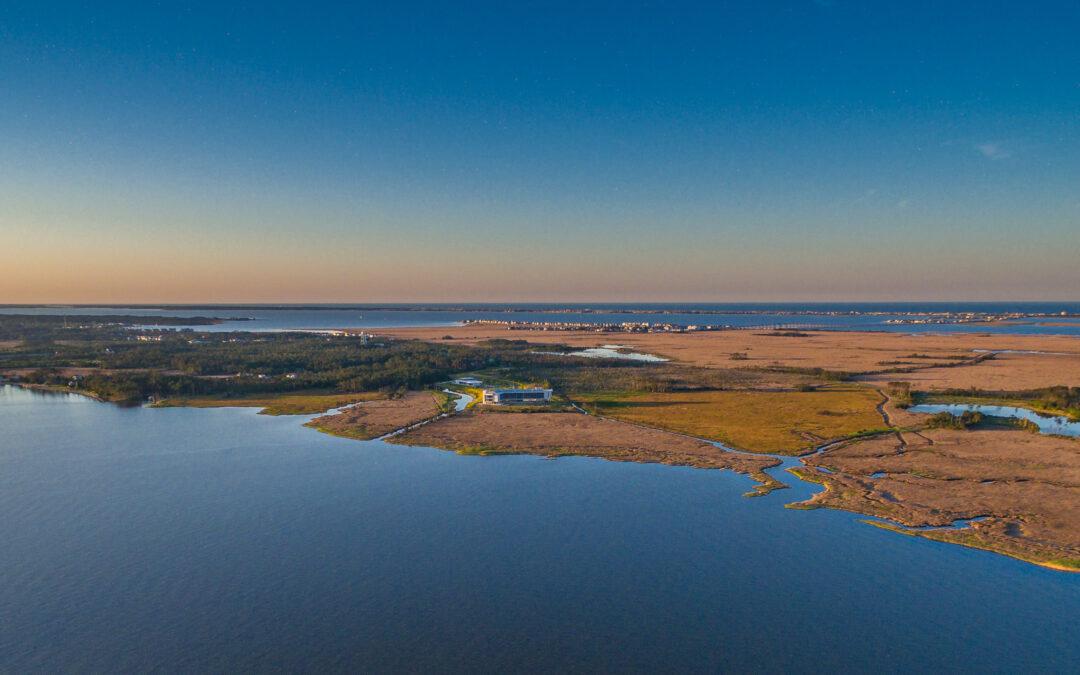Known nationally as Hispanic Heritage Month, September 15- October 15 has been set aside each year to celebrate diverse Latin cultures and backgrounds, as well as the contributions of the Latinx community to American and global societies. More recently and popularly referred to as Latinx Heritage Month, the occasion dates back over 50 years ago to Lyndon B. Johnson’s Proclamation 3869 which launched a week-long celebration that has since expanded to a full month of commemorations including the Independence Days of several Latin American countries. Given such an occasion, ECU’s Integrated Coastal Programs wishes to highlight the experiences, accomplishments, and contributions of its Latinx faculty and students.
Learning to Embrace a New Place

Maria Saldarriaga, her mother, and her brother.
Maria Gomez Saldarriaga is a second-year Integrated Coastal Sciences Ph.D. student from Colombia. She came to the US in 2014 on an ECU tennis scholarship and had an interest in economics, health care, and biology. As a teenager, Saldarriaga did not imagine herself leaving Colombia. She felt a close connection with her family and to her country and believed she had everything she needed close by. Yet, as it got closer to choosing a place of higher education, she learned it was possible to pursue a degree and also receive a scholarship for tennis which would alleviate the financial burden from her family and her.
“When I first came to the US, I was very focused on tennis and my studies. That was it. I was there to learn and then would go back to my country”, shares Saldarriaga. That began to change, she recalls, when a teammate approached her in a Starbucks one day and insisted they were going to be friends.
While she and her teammate became close friends and have remained connected, Saldarriaga’s time in the US has not been without struggle. She reflects on a time when folks would tease and poke fun at her because of the way she spoke and her Colombian heritage, often in front of her classmates. Yet, while this memory makes her grimace, she also knows she learned a good lesson from it with the help of her resilient mother, and she offers the following advice for anyone who is thinking of or already is studying away from home or in another culture.
“Just because you’re not doing things the way someone else thinks is right, doesn’t mean you are doing things wrong.”
She continues, “It is important to understand that, while these unfortunate interactions might happen, you are not the problem. You may not be the smartest or communicate the most effectively, but that does not mean you cannot make it in your profession or through your degree. We cannot allow those that look down on us because of circumstance make us think we are incapable.”
Finding Balance
Another thing that Saldarriaga has grappled with is finding a balance between the culture in which they grew up in or come from and that of the US. For her, she says, the balance is always teetering. Some days she is thrilled to be in studying in the US, but others she feels frustrated and ready to return to her family. Yet, as she has gotten older, she has learned the importance of embracing the best of both cultures.
The idea of embracing both cultures is something to which Dr. David Lagomasino also relates. His parents both emigrated as children from Cuba to Miami, giving up everything in order to have a better life for their families. Several decades later, Dr. Lagomasino, a first-generation Cuban American would spend childhood in Georgia. He and his family later moved back to Miami, but it was sometimes a challenge for him to navigate a new culture.
Much of Miami, particularly the area in which he lived, was essentially an extension of Cuba, a place he has still yet been able to visit, and his family’s culture. Yet, there he was, born in “The Classic City” of Georgia with a twang and a drawl trying to fit into the Miami/Cuban lifestyle. With his grandfather’s childhood stories of Cuba before the revolution and the fact that both his parents also straddle multiple cultures, Lagomasino feels a draw to his Cuban roots. He has now taken it upon himself to learn Spanish hoping that he can connect the dots of his own heritage while also making his own research and teaching more accessible to others.

Lagomasino and his abuelo (grandfather) out fishing.
Celebrating Success
Despite the challenges of navigating multiple cultures, both Saldarriaga and Lagomasino have found success. Saldarriaga completed her Masters at ECU, where she found interest in health insurance algorithms and what qualifies a person as “high risk” for a company, and she is now two years into the Integrated Coastal Sciences Ph.D. Her work focuses on intersections between human health, ecosystem services, and how we value them, specifically from a resilience perspective. Her research is to investigate how the health of humans can be improved or degraded based on the conservation or destruction of ecosystems and its implications during natural disaster events. So far, Saldarriaga has surprised herself.
“Growing up in Colombia, it always seemed like the people who received Ph.D.’s were either the most intelligent or those who had the most financial support from their families,” Saldarriaga explains.
However, she doesn’t consider herself to be from either category, but instead is simply passionate about what she does, especially because it is relevant to her family. Saldarriaga’s brother was in an accident as a small child which has left him unable to walk easily, along with other issues. Because of his condition, if he were in the US, he would be considered “high risk” by health insurance agencies and would be charged high premiums. Yet, despite his condition, he has not been to a hospital in fifteen years, and Saldarriaga believes it is because their mother has set up their home and natural surroundings to be a friendly and suitable environment for him. Thus, Saldarriaga wonders if the algorithms that agencies use could be modified to better incorporate a client’s specific needs and environment, while also considering the natural surroundings that may provide the client with additional benefits linked to their mental and physical well-being.
As for Lagomasino, his Spanish-speaking skills have come a long way. He recently gave his first presentation in Spanish for Con Ciencia en las Américas, a Spanish Language seminar series to engage a broad community of researchers across the Americas. He is excited to reach new audiences and have his research be more accessible to those around the world. The perspectives that his grandfather does share from his time in Cuba are also helpful in shaping Lagomasino’s research, as they give him first-hand insight into how his own family living on the coast used mangroves in their everyday lives.
Relatable Circumstances
Lagomasino is not the only one of Cuban descent found at the Coastal Studies Institute. In fact, he and part-time ECU student Ray Delvillar can relate to each other’s stories regarding their heritage and love for the environment. Delvillar was raised in Powhatan, Virginia, by his grandparents who emigrated from Cuba at a young age. He credits them for passing on their love for nature and conservation to him. For most of their lives and especially as children in Cuba, Delvillar’s grandparents have loved to fish, dive, and snorkel. With such passions shaping much of their lives, they made sure that their grandson was taught to be a steward of the earth from a very young age.

Delvillar at the beach as a young child. His grandparents made trips to the coast with him for as long as he can remember.
Now that he is older, Delvillar incorporates what he was taught into his everyday life. He is currently studying biology and working on a research project under the direction of Dr. Jim Morley to better understand the underwater soundscapes of oyster leases. Additionally, Delvillar is the oyster lease operator for the NC Coastal Federation’s demonstration oyster lease in Wanchese, NC.
Proud of Their Roots
Saldarriaga, Lagomasino, and Delvillar are all proud of their Latin heritage. Though from different countries with different cultures, there is no doubt that their life experiences and heritage have taught them to code-switch between family, friends, and academic careers. We celebrate them, their heritage, and their contributions to the societal needs and research that come out of ECU’s Integrated Coastal Programs.
The Coastal Studies Institute would like to thank Maria Saldarriaga, Dr. David Lagomasino, and Ray Delvillar for each sharing their stories and photos.



 Based at the Coastal Studies Institute (CSI), the North Carolina Renewable Ocean Energy Program (NCROEP) advances inter-disciplinary marine energy solutions across UNC System partner colleges of engineering at NC State University, UNC Charlotte, and NC A&T University. Click on the links below for more information.
Based at the Coastal Studies Institute (CSI), the North Carolina Renewable Ocean Energy Program (NCROEP) advances inter-disciplinary marine energy solutions across UNC System partner colleges of engineering at NC State University, UNC Charlotte, and NC A&T University. Click on the links below for more information. ECU's Integrated Coastal Programs (ECU ICP) is a leader in coastal and marine research, education, and engagement. ECU ICP includes the Coastal Studies Institute, ECU's Department of Coastal Studies, and ECU Diving and Water Safety.
ECU's Integrated Coastal Programs (ECU ICP) is a leader in coastal and marine research, education, and engagement. ECU ICP includes the Coastal Studies Institute, ECU's Department of Coastal Studies, and ECU Diving and Water Safety. The ECU Outer Banks campus is home to the Coastal Studies Institute.
The ECU Outer Banks campus is home to the Coastal Studies Institute.

